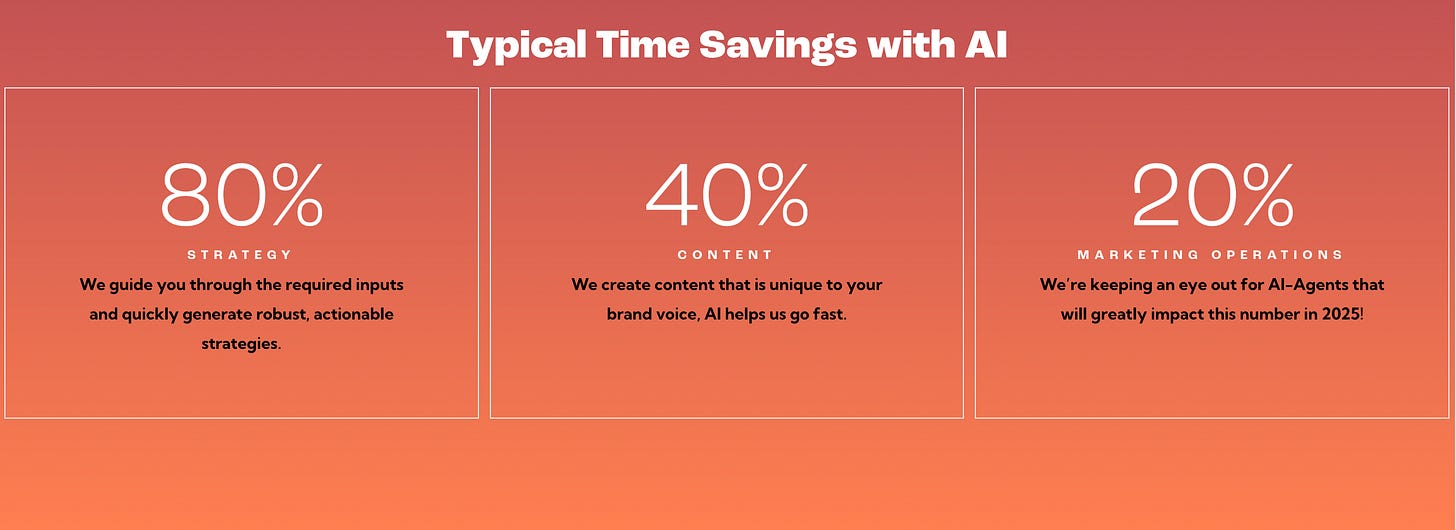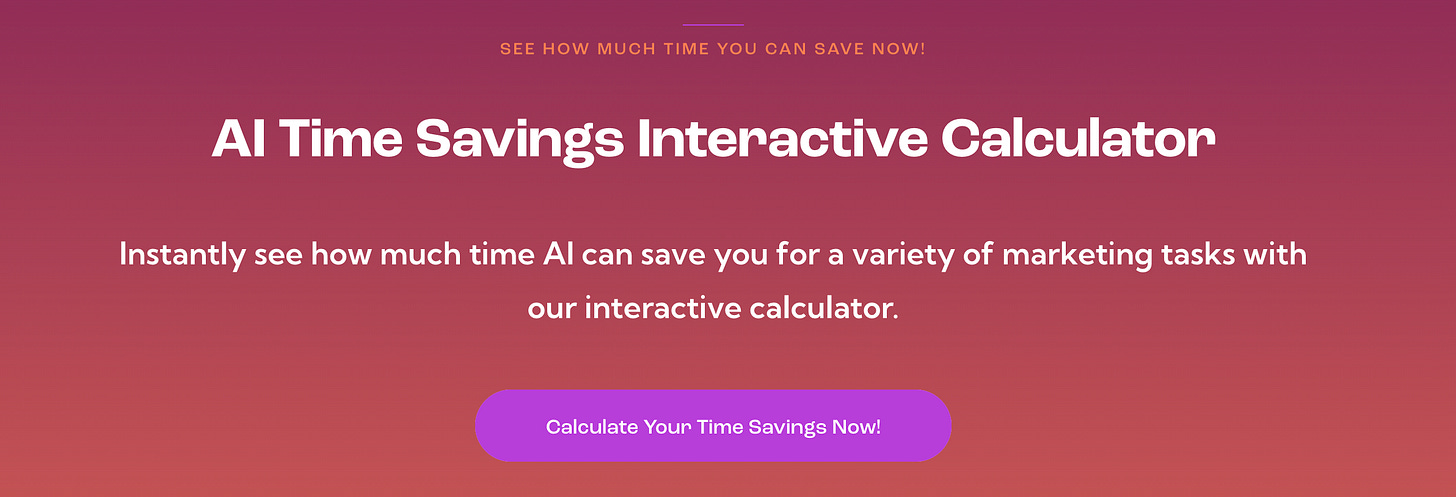“The future is already here – it’s just not very evenly distributed.“
I love science fiction, and the way it taps into our imagination about the future. No doubt, it’s my favorite storytelling genre. That’s why I appreciate these words from William Gibson of Neuromancer fame and so many other amazing works of science fiction.
In a business context, the future is arriving unevenly in organizations across different functions.
In the six months I’ve been writing this newsletter, it’s clear that AI and the era of efficiency are affecting some functions inside organizations right now while others are preparing for what’s to come. While sales still primarily relies on human relationships to be successful, for example, functions like marketing and advertising have found themselves caught in the wake of AI’s power to generate content at unprecedented speed and low cost.
Over the next few months, I’m going to share what I’ve learned from industry experts in different functions about what it means to specifically tell a chapter of a career story in this the age of uncertainty — and this week I’m focusing on marketing.
Perhaps no function in a company is more susceptible to AI’s power than marketing. It’s why I called Pallavi Sharma, a serial CMO, Founder of Wit Omni AI Marketing, and host of the podcast Your AI CMO, for her perspective.
I write this newsletter to help managers prepare for the future — and manage the next generation of talent. Millennials and gen-z know they can’t count on the same predictable corporate ladder boomers enjoyed.
It’s why I emphasize that the primary role of a manager today is to help people on the team write a best-selling chapter of their career story based on their current job role — to prove they are ready and differentiated for the next role — instead of expecting the next rung on the ladder.
As I talk to Pallavi, in the back of my mind, I really want to fit what Pallavi is telling me into the three-act storytelling framework Patti Sanchez and I discussed two weeks ago — for the purpose of helping marketing professionals get specific advice on how to tell their stories, act by act. So that’s how I’ve decided to capture the interview.
Act One: Content is Less Valuable and Time is More Valuable
What’s made marketing such a valuable function inside organizations is its ability to tell a compelling story about a company, product or brand. “Content is king” has always been a defining mantra of marketing teams. Knowing the customer problem, the buyer personas, value proposition, positioning, brand imagery and the key message, among many other “content buckets,” has always made marketing exceptionally relevant.
Until now, according to Pallavi.
“Never in history has the cost of content been so cheap,” she told me. “But what I’ve really found as the real benefit are the time-savings.”
I love that Pallavi has doubled down on AI-enabled time-savings when she positions her work as an AI CMO.
Yes, I know “the mantra”: the only outcomes leaders care about are revenue and cost savings. I’d hope any business leader would recognize time saved at scale is going to result in lower costs or faster time to revenue.
There’ a big lesson here for anyone in marketing: “Have an opinion,” Pallavi tells me.
In act one of a chapter in your career story, what’s your signature result? How does your signature result align to revenue growth and lower costs? What AI marketing outcome are you driving?
Act 2: Human Differentiation
Back when the corporate ladder existed, Pallavi tells me this: “The more robotic you were, the more successful you were,” she says. “Douse your emotion, put your head down, just drive hard — that was rewarded.”
The opposite is required to succeed today, according to her: “It’s time to put your human face on. It’s time to show your emotion and have a point of view.”
Being a “company man” was one of the keys to being successful as a boomer. Conform. Fit it. Don’t rock the boat. Pallavi thinks AI marketers can differentiate their career stories by turning things upside-down: focus on what only a human can do, like strategy and creativity.
So here are act one and two of Pallavi’s career story:
As a CMO, she’s an AI strategist who saves needle-moving amounts of time creating equally or better content in service to driving revenue and lowering costs.
Can you say something so succinct about yourself? Can you differentiate you story this way? How are you positioning your brand?
Act Three: “Build in Public”
With AI creating so much content today in all our respective feeds, one of the big questions today is, “what can I trust.” What’s authentic? What’s real?
Pallavi tell me this is is an opportunity. She’s a big believer in “build in public” — an idea born from watching start-up founders like Grant Lee, who recently posted this on LinkedIn as a advice to young people: “Build real things. Document the process. Watch what happens.”
I talk a lot about expressing your point of view as the key to differentiating yourself. I’m in love with this idea of “building” things that showcase your potential to succeed in the next role. What Pallavi and Grant are encouraging people to do is to combine their unique point of view with AI software in some way.
I think this may be a new form of thought leadership.
It’s just one example in her portfolio, but Pallavi built an AI-powered time-savings calculator for marketing professionals. It is an amazing example of a software-powered platform built around her belief that time-savings is the true benefit and business value in AI marketing. It’s exactly what “building in public” means.
Acts 1, 2, 3: Less than 50 Words
I always believe you have to be prepared to “bring it home” in front of decision-makers. I’m not sure Pallavi would say exactly these things about herself, but here are less than 50 words to describe her career story:
As a CMO, she’s an AI strategist who saves needle-moving amounts of time creating equally or better content in service to driving revenue and lowering costs - are you ready to see how much AI Marketing can save you?
Managers of the world — it’s your job help people build their stories. In return, you’ll have a motivated team ready to literally kick ass on your behalf.
Start with yourself, what’s your three-act story?
Manager Thought of the Week
"G-FAT."
This abbreviation stood for “Get your fucking act together” when I and a bunch of early-in-career marketing professionals worked for Donovan Neale-May, one of the original marketing geniuses of emerging Silicon Valley. Donovan would frequently tell us to get our “act” together when he didn’t feel that the creativity of our work was up to snuff. Donovan was my first mentor, and he taught the value of creativity. I still believe creativity is a human skill because it requires imagination. I was never as crazy creative as Donovan, but he encouraged me to believe creativity could be a differentiating career skill. I could not have been luckier to have him as my first professional boss.
In Summary: Principles of Managing in the Age of Uncertainty
I left Cisco to answer this question with research and evidence: What does the manager of the future look like? What are millennials and gen-z seeking in a manager? Which behaviors, tactics, skills or processes matter? What’s it going to take to attract and keep the best people over the next decade? In short, how to be a great manager.
Based on this research, the core philosophy of this newsletter is rooted in one idea: successful managers in this moment in time, for this generation of talent, need to be “career dot-connectors.” The next-gen doesn’t expect to spend their entire career on your team — that’s an idea boomers grew up with. A job on your team is like a chapter in a career story to the current generation. If you want the best people on your team, you have to connect the dots between roles on the team and the career opportunities of the people working on the team.
What is the“Age of Uncertainty”? If the industrial age was about taking predictable steps up the ladder, the age of uncertainty is about finding or discovering the path of a career without any predictable steps, without an obvious ladder — it’s why being a career dot-connector will differentiate you as a manager.
How to be a Great Manager in the Age of Uncertainty: Be a Career Dot Connector is available on Amazon.
What kind of manager are you? Take my free self-assessment and learn about yourself.







Love this Ron. Thanks. You’re providing so much value every week.